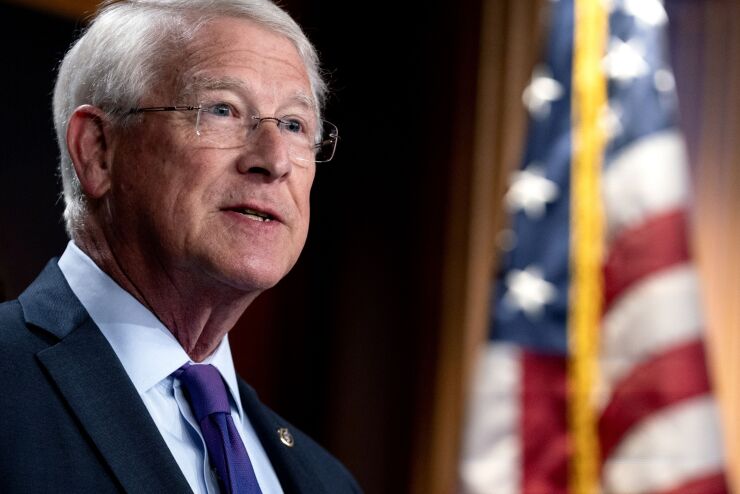A bipartisan group of senators reintroduced a direct-pay bond bill to help finance infrastructure, garnering support from municipal bond groups.
Sens. Roger Wicker, R-Miss., and Michael Bennet, D-Colo., reintroduced their American Infrastructure Bonds Act of 2021, that would create a new class of direct-pay taxable bonds to help fund infrastructure. The concept is broadly similar to the hugely popular Build America Bonds program that ended some 11 years ago.
“Empowering local leaders to launch new infrastructure projects is a proven way to support local economic growth,” Wicker said. “This legislation would improve upon previous efforts to expand investment in the state and local bond market by increasing flexibility for communities and adding assurances for bondholders. As our nation looks to invest in public works, now is the right time for Congress to allow state and local governments to seize this opportunity and renew infrastructure across the nation.”

The bill would include a subsidy rate of 28% on the bonds and would be exempt from sequestration. As with Build America Bonds, the issuer would receive a direct payment from the federal government to cover a percentage of the interest costs associated with the taxable bonds. A similar House bill was
That bill differs a bit from the Senate version by having a direct-pay subsidy starting at 42% and subject to sequestration.
Municipal bond groups said the Senate bill would help attract taxable bond investors.
“This bill authorizes a direct-pay subsidy for American Infrastructure Bonds, which allows state and local governments to attract taxable bond investors, such as insurance companies, pension funds and foreign investors, to invest in infrastructure projects,” said Kenneth Bentsen, SIFMA president and CEO. “Increasing the demand for municipal securities is particularly helpful now, as state and local governments are experiencing much higher costs due to the COVID-19 pandemic.”
The American Securities Association said it looked forward to working with policymakers to ensure the program is included in any infrastructure bill.
The National Association of Counties said the Senate bill would help counties invest in much-needed infrastructure improvements, create jobs and revitalize local economies.
“Expanded access to the taxable bond market will incentivize and boost investment in local communities,” said Matthew Chase, NACo CEO and executive director. “As responsible stewards of taxpayer dollars, counties appreciate efforts to expand infrastructure financing options while preserving local decision-making.”
The path for municipal bond provisions to be included in an infrastructure bill is clear, though it could face some hurdles. Sources expect Democrats to have a similar bill proposed from last year — the Moving Forward Act. That bill from House Democrats last summer would have permanently reinstated Build America Bonds and tax-exempt advance refundings as well as expanded the issuance of private activity bonds. That bill died in the then-Republican-controlled Senate.
Senate Republicans
It’s still possible that an infrastructure bill goes through reconciliation — a tool lawmakers use to conform tax and spending levels to the levels set in a budget resolution. The tool limits lawmakers’ ability to create new policy, limits Senate debate time and comes with a 10-year budget window.
Sources have said direct pay bonds authorized in a reconciliation bill could be issued within the 10-year window, though it is more likely any such program would have a much shorter issuance window than that. Issuers could continue to receive subsidy payments beyond the 10 years, but payments received past that mark would have to be offset by revenue in the bill. There is a possibility still that the subsidy could be frontloaded, to start out high and drop off each year.
Also this week, the Problem Solvers Caucus released a new report on bipartisan policy recommendations for infrastructure. The Problem Solvers Caucus is a bipartisan group of lawmakers that seek to foster bipartisanship.
In the report, the group called for preserving and expanding tax-advantaged infrastructure financing options through maintaining the federal tax-exempt status for municipal bonds as well as increasing the private activity bond state volume caps. They also want to incentivize states to adopt public-private partnerships.
The 58-person caucus also recommended increasing the gas tax and implementing a vehicle miles traveled program to fund the depleted Highway Trust Fund. The Biden administration has said raising the federal gas tax is off the table and instead wants to increase the corporate tax rate to 28% from 21% to pay for infrastructure.
“We cannot afford four more years of crumbling bridges, roads, and tunnels, lead-filled pipes, and failed transportation, which is why the Problem Solvers Caucus is putting partisanship aside to find a solution that brings both parties to the table," said Rep. Josh Gottheimer, D-N.J., Problem Solvers Caucus co-chair.





